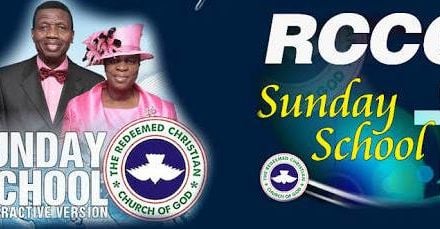
RCCG YAYA Sunday School Teacher Manual 9 April 2023 Lesson 32 — Managing Difficult People
Click HERE for Previous RCCG Sunday School Manual
TOPIC: Managing Difficult People (RCCG Sunday School Manual For Young Adults And Youths (YAYA)
OPENING PRAYER: Heavenly Father, give me the wisdom I need to relate well with people. (Scroll down for RCCG YAYA Sunday School 9 April 2023 HYMN)
MEMORY VERSE: “It is honorable for a man to stop striving, Since any fool can start a quarrel.” – Proverbs 20:3 (NKJV)
BIBLE PASSAGE: Genesis 13:7-11 (NKJV)
7 And there was strife between the herdsmen of Abram’s livestock and the herdsmen of Lot’s livestock. The Canaanites and the Perizzites then dwelt in the land.
8 So Abram said to Lot, “Please let there be no strife between you and me, and between my herdsmen and your herdsmen; for we are brethren. 9 Is not the whole land before you? Please separate from me. If you take the left, then I will go to the right; or, if you go to the right, then I will go to the left.”
10 And Lot lifted his eyes and saw all the plain of Jordan, that it was well watered everywhere (before the Lord destroyed Sodom and Gomorrah) like the garden of the Lord, like the land of Egypt as you go toward Zoar. 11 Then Lot chose for himself all the plain of Jordan, and Lot journeyed east. And they separated from each other.
Also Read:
– RCCG Sunday School Teacher Manual 9 April 2023: Mental Health
– RCCG Sunday School Student Manual 9 April 2023 – Mental Health
– Open Heaven 9 April 2023 – What Do You See?
INTRODUCTION: A difficult person may be one who is snobbish argumentative, quarrelsome, selfish, insensitive, or rude. Difficult people seem to know just how to “push one’s buttons” and stir up trouble. By difficult person, we mean people with certain personality traits or emotional characteristics that makes it difficult for you to relate with them. Difficult people can take many forms; however, it is expedient to learn how to manage them.
TEACHING REVIEW: GENESIS 13:7-11
In Genesis 13:7, the Bible recorded that “there was a strife between the herdsmen of Abraham’s cattle and herdsmen of Lot’s Cattle”
The teacher should identify five (5) things Abraham did to curtail the strife from Genesis 13:8-12.
i. ………………..
ii. ……………….
iii. ………………
iv. ……………….
v. ………………..
LESSON OUTLINES
- IDENTIFYING DIFFICULT PEOPLE
- HOW TO MANAGE DIFFICULT PEOPLE.
1. IDENTIFYING DIFFICULT PEOPLE
There are different types of difficult people.
- The ‘Downers’: Those who always have something bad to say, complain, criticise and judge (2Samuel 6:20-21).
- The ‘Better Tanks’: Also known as ‘Know it all.’ They are arrogant and usually think their opinion in superior on every issue. When they are wrong, they get defensive (1Samuel 2:3).
- The ‘Passives’: Also are known as ‘Push-Overs.’ They do not contribute much to conversations or people around them and let other do the hard work (Luke 10:40).
- The ‘Snipers’: These are quick attackers; they use rude comments, biting mockery, or insults that cut people down during interactions (Nehemiah 2:19; 4:3).
- The ‘Blame gamers’: Those who shift blames or give excuses for their wrongdoings rather than try to resolve a problem (Genesis 3:9-12).
- The ‘Yes People’: They agreed to every commitment, yet rarely deliver. You cannot trust them to follow through (Matthew 21:28-30).
- The ‘No People’: They are quick to point out why something will not work. They are inflexible (2Kings 7:1-2)
- The ‘Dictators’: They bully and intimidate, they are constantly demanding and brutally critical (2Chronicles 32:9-15).
- The ‘Grenade Person’: This person, after a brief period of calm, explodes into unfocused ranting and raving about things that have nothing to do with the present circumstances (Matthew 2:16)
- The ‘perfectionist’: Someone who is unwilling to settle for anything that is not perfect or does not meet extremely high standards.
CLASS ACTIVITY 1
The teacher and the students should discuss their experience if they have once been toxic.
2. HOW TO MANAGE DIFFICULT PEOPLE
Our response to difficult people should model the examples provided by Jesus. Here are some of the things we need to do:
- Be calm: Avoid losing your temper at difficult people (Proverbs 14:29).
- Understand the person’s intentions: Try to identify the persons trigger. Find out what is making them act difficult (1Thessalonians 5:21).
- Do a ‘background check’: Find out how others have been relating with the person (Ecclesiastes 1:13).
- Let the person know your intentions: Sometimes, people are resistance because they think you being difficult with them (Colossians 4:6).
- Build a rapport: Try to establish a close relationship with the person and learn about their families, hobbies, important dates, etc (Proverbs 18:24a).
- Escalate to a higher authority for resolution: Sometimes, the way to get along with the person may be through the top-down approach (Matthew 18:15-17).
- Apply godly wisdom: Sometimes, wisdom demands that you learn how to avoid conflict with a difficult person or know when to walk away.
You need to be careful not to become the ‘difficult person’ yourself (Proverbs 22:3).
CLASS ACTIVITY 2
What are the possible effects of difficult people on one’s health?
CONCLUSION
Dealing with difficult people is an exercise in patience, love and grace.
CLOSING PRAYER
Heavenly Father, please help me not to be a difficult person and if I am one already, Holy Spirit prune me to be who God wants me to be.
ASSIGNMENT
Mention five (5) practical ways to handle toxic people (2×5=10 Marks).
SUNDAY SCHOOL HYMN
- O Sunday School, on the Lord’s day,
O how I love Thee well,
I am happy, it makes me glad
To rejoice at Thy birth. - O Sunday School, on the Lord’s day,
Thy friend friendship suits me well,
Both young and will sing Thy song,
We long for Sunday School. - O Sunday School, on the Lord’s day,
Christ was Thy first teacher,
The Holy Spirit, great teacher,
Does manifest in thee. - O Sunday School, on the Lord’s day,
This testimony is sure,
That God, the Father Almighty,
Poured His blessing on Thee - O Sunday School, on the Lord’s day,
Though the sun be so bright,
Or if the clouds be black with rain,
I’ll be in Sunday School. - O Sunday School, on the Lord’s day
I rejoice to see Thee,
Will thou pass over me today?
Without my being blest?



